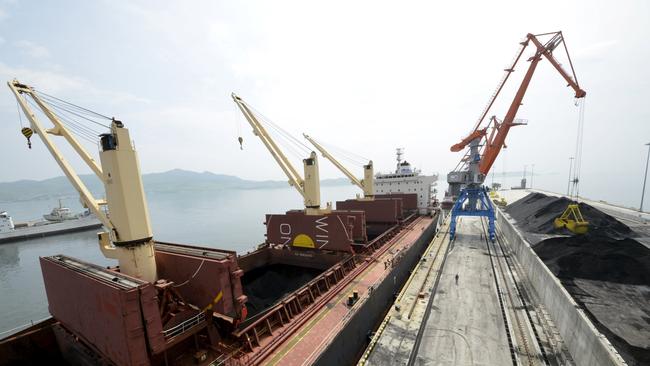Tensions threaten coal exports
Australia’s coal sales to China could be cut as its domestic coal industry recovers, China’s Global Times has warned.

Australia’s coal sales to China could be cut as its domestic coal industry recovers and political tensions increase, China’s Global Times has warned.
A report in the state-owned populist newspaper this week quoted analysts saying the recovery in the Chinese domestic coal industry from its COVID-19 downturn earlier this year now puts Australian coal “in a vulnerable position” due to the increasing tension between the two countries.
“A persistent supply glut in China’s coal industry in recent weeks is increasing the likelihood China will restrict Australian coal imports as bilateral ties plunge to their coldest point in decades,” the Global Times said.
It suggests Russia could step in to replace coal imports from Australia, with a plan to increase its total exports to China to 55 million tonnes by 2025.
The reports come as China this week warned potential tourists against coming to Australia, citing racism and possible safety issues, following moves to impose an 80 per cent tariff on Australian barley and a suspension of import licences for several major Australian beef plants.
Australia’s coal sales to China jumped by 77 per cent during the first four months of the year to 43 million tonnes compared with the same period last year — a trade worth $US4.5bn ($6.5bn), according to statistics from the General Administration of China Customs.
The increase in Australian coal sales over the period came as China’s coal industry was cut back as a result of the COVID-19 crisis.
But the Chinese industry has now largely recovered, pressuring the government to reduce imports, and with the rising political tensions making Australian coal a potential target.
China’s total coal imports jumped by 27 per cent to 127 million tonnes during the first four months of the year, compared with the same period in 2019, as a result of the domestic production downturn.
But the recovery in the domestic industry saw total coal imports in May down by 20 per cent compared with May 2019.
Li Chaolin, an expert with the China Coal Transportation and Sale Society, told the Global Times the domestic glut of coal “has put Australian coal imports in a vulnerable position”.
“Oversupply, high inventory at ports and weak prices have put huge pressure on China’s own coal producers, which are playing a role in ensuring jobs and incomes in the wake of the economic impact of the COVID-19 epidemic,” he said.
The Global Times’ comments this week follow reports in May that the Chinese government had told some power plants in China to stop importing Australian coal.
Resource analyst S&P Platts reported in May that China’s National Development and Reform Commission had told five major state-owned utilities not to buy Australian thermal coal for the time being, in a move designed to boost domestic coal prices.
Platts reported at the time that Russian coal was sought as a substitute for high calorific coal from Australia. Platts quoted a Shanghai-based trader, reporting that he was “surprised” to see traditional buyers of Australian coal in China now making inquiries about buying coal from Russia.
The growing economic problems of the coal industry have become a cause for concern in China.
Domestic coal producers blame the big increase in imports in the first few months of the year for putting them under financial pressure.
But the weakness in the Chinese economy and low world coal prices have also added to their financial pressures.
“Chinese analysts said the government is walking a tightrope in keeping coal mines afloat without pushing fuel costs too high for power plants, which may impede the resumption of work and production in the country,” the Global Times said.
Australia’s sales of iron ore to China remained strong during the COVID-19 crisis as Chinese steel mills kept up production.
With imports from its major rival Brazil cut back due to the continued fallout from Vale’s accident, China has had little option but to continue to buy iron ore from Australia.
But Lin Boqiang, director for the Centre of Energy Economics Research at Xiamen University, told the Global Times that China’s reliance on coal from Australia was much more limited. He said this gave Chinese policymakers much more room to manoeuvre compared with iron ore. Mr Lin said the Chinese coal industry would be “very happy” if there was a cutback on coal imports.
While China is the largest export market for Australian coal, China’s coal imports from Australia are a fraction of its total domestic production.
But it appears political tensions with Australia will open the door for Russia, a country with increasingly strong political ties with Beijing.
Chinese customs data for the first four months of the year show that Australian exports of coking coal were up by 84 per cent over the first four months of the year to 43 million tonnes, compared with last year, with the value up by 39 per cent to $US4.5bn.
Australian thermal coal exports were up by 73 per cent to 23.3 million tonnes, with the value up by 35 per cent to $US1.6bn.
Australian exports of thermal coal over the period made up 42 per cent of China’s total imports over the period by volume and 45 per cent by value.
Tania Constable, the chief executive of the Minerals Council of Australia, said the Chinese coal industry was recovering after the pandemic shutdown.
“We are seeing China open up a bit more,” she said.
“Now they are relying on their own domestic supplies rather than importing it.”
She said the issues with processing Australian coal in China were not over yet. “It waxes and wanes,” she said. “There are complexities. The industry-to-industry relationship with China is very good.
“We are focusing on the long term. It’s a complex relationship.”


To join the conversation, please log in. Don't have an account? Register
Join the conversation, you are commenting as Logout